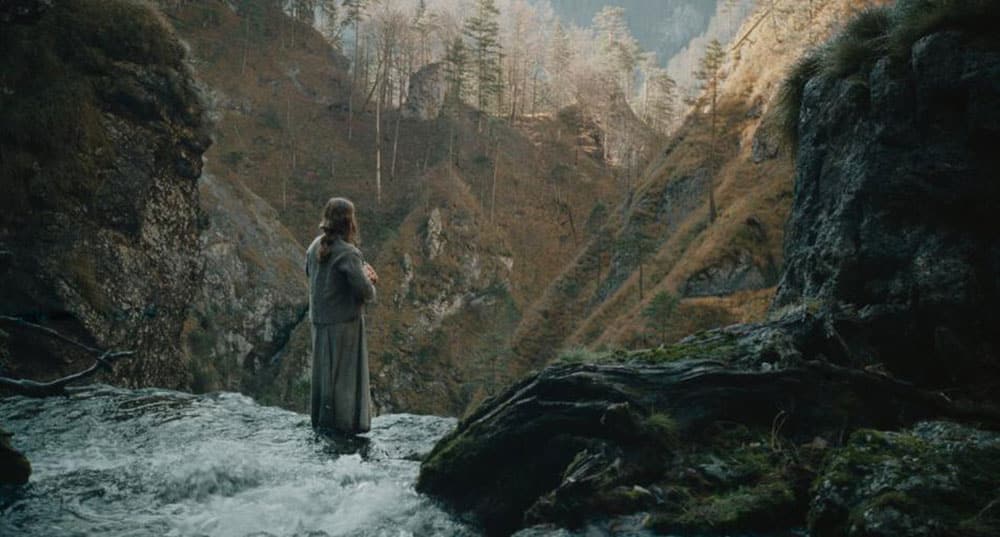“The Devil’s Bath” is a brutal, devastating depiction of despair and depression ripped from historical records rife with real-life horror.

The Devil’s Bath is the third feature from talented Austrian filmmaking duo Veronika Franz and Severin Fiala (Goodnight Mommy, The Lodge).
Though it sounds like it should be a spooky religious horror film, the title is derived from an 18th-century vernacular for melancholia. The story is inspired by historical research of the period when strict religious doctrine made suicide an unpardonable sin — the one sin God could not forgive, dooming a soul to eternal damnation.
As a result, hundreds of people (mostly women) across Europe found a tragic loophole to escape their never-ending misery: suicide by proxy. By committing an act of murder and confessing their crime, they could be absolved of their sin and legally executed, freeing them of their affliction while saving their soul.
Victims tended to be young children, deemed innocent in the eyes of the Church. This was often considered an act of mercy as they could be released from their mortal prison before their souls could become corrupted.
From the film’s harrowing opening scene, immediately invoking the austere natural beauty and historical accuracy of Robert Eggers’ The Witch, we see the dire consequences of this troubling view on salvation.
After the jaw-dropping prologue, we cut to an exuberant wedding ceremony between Agnes (Anja Plaschg) and Wolf (David Scheid).
What begins as a joyful and hopeful celebration quickly turns to slow-burning anguish.

Agnes finds herself in a drab homestead, isolated from her family, with no purpose other than to be used as a weary workhouse. She’s tasked with cooking, cleaning, and tending to the home and stable. She also engages in backbreaking labor to trudge a mud-thickened pond for fish.
Her attempts to find moments of fleeting joy by walking in nature or decorating the home with wildflowers are rebuked and ridiculed.
Trapped in a loveless and passionless marriage with a respectable but disinterested husband and a harshly critical and overbearing mother-in-law (Maria Hofstatter), she is denied the one thing she longs for most: motherhood.
To make matters worse, she’s blamed for her inability to conceive a child, even though it’s her husband who refuses to touch her.
Her mental state begins to deteriorate as the reality of her life sinks in, along with the realization that there is no hope to end her despair. She consumes rat poison so she can rot in bed rather than face the existential dread of her dreary existence. When she’s discovered, Wolf forces her to endure barbaric methods of “curing” women of their melancholy.
After a futile attempt to escape back to her family results in her being dragged back home kicking and screaming, Agnes gives into the hopelessness of her heartbreaking plight.
It culminates in an inevitable but gut-wrenching scene of abject desperation that will leave you reeling.
It’s not horror in the traditional sense, but it’s nonetheless horrifying.

A dark and atmospheric period drama, it’s a relentlessly grim psychological nightmare that’s breathtaking in its ability to reflect the horrors of human suffering.
It requires patience and will likely alienate those who lack an appreciation for moody, methodically paced arthouse horror.
Plaschg is captivating and achingly convincing as the ever-present lead, and her torment is palpable. A talented musician (recording as Soap&Skin), she also composed the haunting score that heightens the film’s chilling and oppressive mood.
The film’s nihilistic climax brings us full circle, once again inviting us into a spirited village celebration where a grisly end is met with as much — or more — rabid jubilation as a new beginning.
It’s a sobering and spine-chilling portrayal of a woman, like thousands of other women before and after her, whose tragedy feels pre-ordained — carved in religious text meant to imprison her physically and emotionally, where mercy exists only in death.














Follow Us!